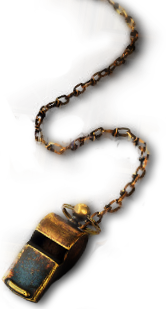1910

John Robert Wooden is born on Friday morning, October 14th, 1910 - Hall, Indiana. He is the second son of Hugh Joshua and Roxie Anna Wooden. Two more sons were born in the next four years.
1918

Wooden family moves to a small farm near Centerton, Indiana; population, 86.
1924
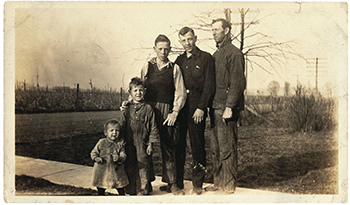
Hard times force Wooden family off the farm. They move to nearby Martinsville, Indiana; pop. 4,800. John Wooden's father, Joshua, supports family by working in a local sanitarium.
July, 1926
John Wooden and Nellie Riley meet at a summertime carnival in Martinsville. Johnny falls for Nellie. Nellie falls for Johnny.
1926
Martinsville High School basketball team, the Artesians (named after a local sponsor), loses in finals of Indiana State High School championships to Marion High School, 30-23. Martinsville's coach, Glenn 'The 'ol Fox" Curtis, is an early mentor to John Wooden.
1927
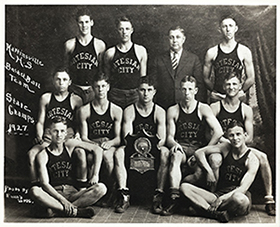
Martinsville wins Indiana State High School Championship defeating Muncie Central, 26-23. Hoosiers, a popular film starring Gene Hackman, depicts the hysteria by Indiana fans for basketball during these decades. John Wooden, the player (and later, coach), was molded in that Hoosier cauldron of pressure, expectations, and competition. He observed many years later that the emotion and near-frenzy by spectators at games exceeded anything he experienced at the college level as a coach.
1928
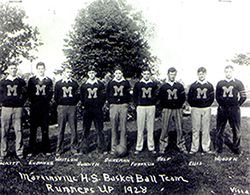
Johnny Wooden is captain of the Martinsville High School team that loses in the Indiana state high school championship to Muncie, 13-12, on a last second shot by Muncie center Charlie Secrist following a missed basket by Johnny Wooden that would have sealed the victory. Seventy years after Secrist's game winner John Wooden remembers that moment: "To this day, it is the highest arched shot I have ever seen. It seemed to go up through the rafters and come straight down through the hoop. Losing that game was the most disappointing thing that ever happened to me as a player."
1928
Johnny Wooden enrolls at Purdue University, West Lafayette, Indiana. His college coach, Ward 'Piggy' Lambert becomes a pivotal figure in his life: "Piggy Lambert was the greatest influence on me both from the standpoint of playing and coaching. Coach Lambert had a fetish for details."
1928-32
Purdue Basketball Highlights: Johnny Wooden leads Purdue to 1932 National Championship, Big Ten Championships (1930 and 1932); captain of Purdue team (1931-32); Three-time All-American (first-ever consensus choice); All Big Ten Team; nicknamed 'The Indiana Rubber Man' for his suicidal dives on the hard court in pursuit of the basketball; one of only two men enshrined in the Hall of Fame as both a player and as a coach (Lenny Wilkins is the other). Equally important to John Wooden, he received the Big Ten Medal for Scholarship and Prowess. John Wooden is named '1932 College Player of The Year."
August, 1932
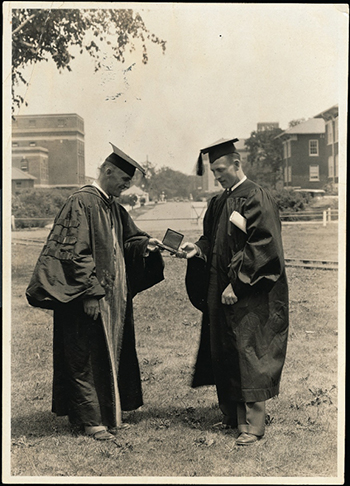
John and Nellie marry in a small ceremony in Indianapolis. Attend a Mills Brothers concert at the Circle Theatre to celebrate. "I thought they'd never quit singing," he recalled of the honeymoon night.
September, 1932
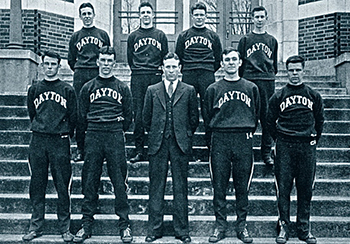
John Wooden officially becomes 'Coach' John Wooden, begins job as Athletic Director, coach, and English teacher at Dayton High School, Dayton, Kentucky: The Green Devils.
1932
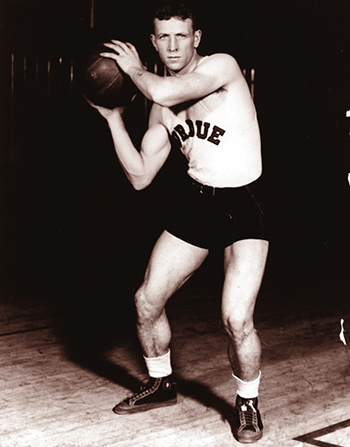
The Dayton Green Devils (and their new coach, John Wooden) win six games, lose eleven. It is the first and only losing season John Wooden ever has as a coach. (As a player, he never experienced a losing season. )
1934
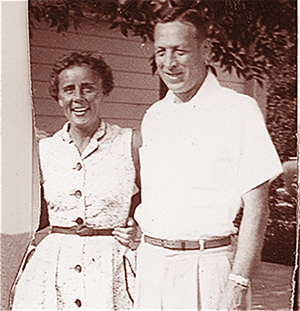
Coach Wooden and Nellie move to South Bend, Indiana where he accepts coaching and teacher position at South Bend Central High School - the Bears. Coaching basketball, baseball, and teaching English, John Wooden also works part time as an editor for a local book publisher. Along the way, daughter Nan and son Jim arrive.
1942
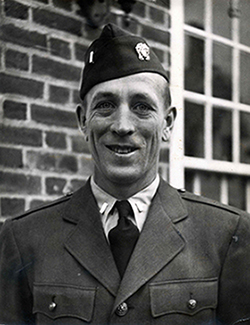
USA enters WW II. 'Coach' Wooden becomes Lieutenant (Jr. grade) Wooden, U.S. Navy. Ruptured appendix keeps him from his first assignment on-board The U.S.S Franklin, an Essex class aircraft carrier. Soon thereafter, his replacement is killed during a kamikaze attack on the Franklin in the Pacific.
1946
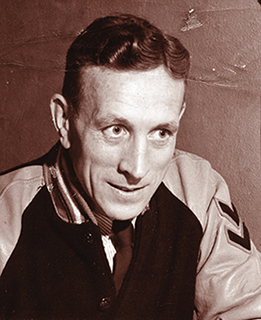
Following his release from the Navy, Coach Wooden returns briefly to South Bend Central High School. Then accepts teaching and coaching assignment at Indiana State Teachers College, Terre Haute, Indiana. His high school coaching record is a portent of things to come: 218 wins; 42 losses.
1946-47
Indiana State Teachers College wins conference title. Coach Wooden rejects invitation to compete in a major post-season NAIB tournament (National Association of Intercollegiate Basketball) because African-Americans are not allowed to participate.
1947-48
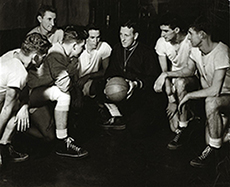
Indiana State again wins conference title. Coach Wooden again turns down invitation to participate in the post-season tournament. Within days the NAIB decides to change its policy and agrees to allow African-Americans to compete. Coach Wooden then accepts tournament invitation. Clarence Walker, a reserve guard for Indiana State, becomes first black player to compete in NAIB tournament. The color barrier in post-season tournaments for white colleges and universities has been breached. Within the next few years it all similar tournaments adopt the "no-segregation" policy.
1948
Coach Wooden, 37, and Nellie (with young son Jim, and daughter, Nan) move west when UCLA offers him the head coach position for men's basketball: "I had hoped to take the job at the University of Minnesota, but a snow storm knocked out telephone lines there and they didn't call back at 6 pm as they had promised. UCLA called about fifteen minutes later and offered the job." He accepted.
1948-49
Coach John Wooden takes over a UCLA basketball program that was 3-9 in conference play during the previous season, 1947-48. In his first year he turns the program around. The Bruins are Pacific Coast Conference (PCC), Southern Division, Champions; 10 wins, 2 losses (conference); 22-7, overall.
1949-50
10-2 (PCC): UCLA wins Pacific Coast Conference title; NCAA West Regional, first round at Kansas City, March 24, '50: UCLA loses to Bradley 73-59.
1950
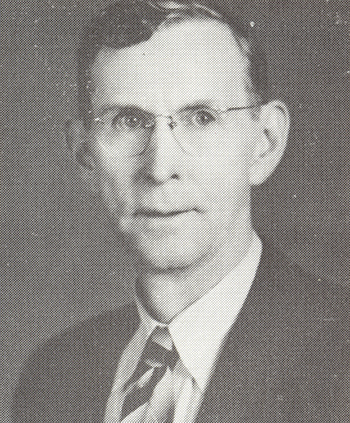
Joshua Hugh Wooden dies and is buried not far from the old family farm in Centerton, Indiana.
1950-51
9-4 (PCC) UCLA champions of Pacific Coast Conference.
1951-52
8-4 (PCC) UCLA wins PCC championship; NCAA West Regional, first round at Corvallis, OR, March 21, '52: UCLA loses to Santa Clara 68-59.
1952-53
6-6 (PCC): No titles, no championship.
1953-54
7-5 (PCC): Two years without a title or championship. The best is yet to come, but not for awhile.
1954-55
11-1 (PCC): UCLA champions of Pacific Coast Conference.
1955-56
UCLA wins Pacific Coast Conference title; 16-0; NCAA West Regional, first round at Corvallis, OR: UCLA loses to USF 72-61.
1956-57
UCLA goes 13-3 in conference. No post-season play.
1957-58
UCLA dips to 10-6 In Pac-8. No post-season invites.
1958-59
UCLA struggles to another 10-6 Conference record. No post-season action.
1959-60
UCLA stays above .500 with a 7-5 Conference record. No post-season invitations.
1960-61
UCLA rebounds to 18-8 season, but stays at 7-5 in Conference. No post-season tournament play.
1961-62
UCLA is Pac 10 Champion; 10 wins, 2 losses; NCAA West Regional, first round at Provo, UT, March 16, '62: UCLA 73, Utah State, 62; West Regional Championship at Provo, UT, March 17, UCLA 88, Oregon State 69; NCAA Championship semi-final, Louisville, KY: UCLA loses to Cincinnati 72-70.
1962-63
UCLA Pac 10 co-champion; 8 wins, 5 losses; NCAA West Regional, first round at Provo, UT, March 15, '63, UCLA loses to Arizona State 93-79.
1963-64
(The first national championship!)
UCLA is Pac 10 Champion; 15 wins, 0 losses; NCAA West Regional, first round at Corvallis, OR, March 13, '64: UCLA 95, Seattle 90; NCAA West Regional championship, March 14 at Corvallis, OR: UCLA 76, USF 72; NCAA Championship semi-final, March 20 at Kansas City, MO:UCLA 90, Kansas State 84; NCAA Championship, Kansas City, March 21, 1964: UCLA 98, Duke 83.
1964-65
(The second national championship)

UCLA Pac 10 champion; 14 wins, 0 losses; NCAA champions: NCAA West Regional, first round at Provo, UT, March 12, '65: UCLA 100 Brigham Young 76; NCAA West Regional championship, March 13, Provo, UT, March 13: UCLA 101, USF 93; NCAA Championship semi-final, March 19 at Portland, OR: UCLA 108, Wichita 89; NCAA Championship, March 20: UCLA 91, Michigan 80.
1965-66
UCLA finishes second in conference: 10-4; wins the Los Angeles Classic. An omen of the future appears: Lewis Alcindor, a freshman on the JV team, leads them to victory over the varsity team which was the defending national champions. (Lewis was taken out of the game by JV Coach Gary Cunningham to avoid appearance of running up the score on the varsity team.)
1966-67
UCLA Pac 10 champion; 14 wins, 0 losses; NCAA champions. Third time. Outscore Dayton in finals: 79-64.
1967-68
UCLA Pac 10 champion; 14 wins, 0 losses; NCAA champions. Fourth time. Outscore North Carolina in finals: 78-55
1968-69
UCLA Pac 10 champion; 13 wins, 1 loss; NCAA champions. Fifth time. Outscore Purdue in finals: 79-72.
1969-70
UCLA Pac 10 champion; 12 wins, 2 losses; NCAA champions. Sixth time. Outscore Jacksonville in finals: 80-69.
1970-71
UCLA Pac 10 champion; 14 wins, 0 losses; NCAA champions. Seventh time. Outscore Villanova in finals: 68-62
1971-72
UCLA Pac 10 champion; 14 wins, 0 losses; NCAA champions. Eighth time. Outscore Florida State in finals: 81-76.
1972-73
UCLA Pac 10 champion; 14 wins, 0 losses; NCAA champions. Ninth time. Outscore Memphis State in finals: 87-66.
1973-74
UCLA's historic streak of seven March Madness national championships ends. N. Carolina State outscores UCLA in double-overtime: 80-77.
1974-75
UCLA Pac 10 champion; 12 wins, 2 losses; NCAA champions. Tenth time in 12 years. Outscore Louisville in overtime: 75-74. Two days before the game Coach Wooden announced to the surprise of all that he would retire regardless of the outcome.
1975 onward
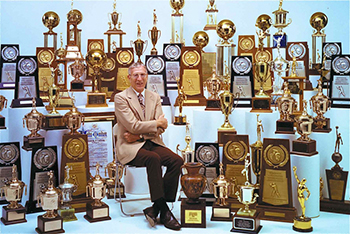
Coach Wooden spreads his philosophy in basketball clinics,seminars, best-selling books, personal appearances, interviews and an award-winning PBS Special: JOHN WOODEN: Values, Victory, and Peace of Mind.
1997
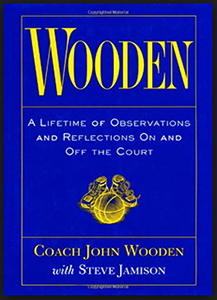
WOODEN: A Lifetime of Observations and Reflections (McGraw-Hill) becomes an international best-seller and leads to a best-selling sequel: My Personal Best (McGraw-Hill); a best-selling children's book, INCH and MILES: The Journey To Success (Perfection Learning); WOODEN ON LEADERSHIP (McGraw-Hill); and more.
1999-2000
ESPN selects Coach John Wooden as 'Coach of The 20 Century'; Sports Illustrated: "There's never been a finer coach in American sports than John Wooden. Nor a finer man"; Sport Magazine: "Greatest Coach of the Century."
2003
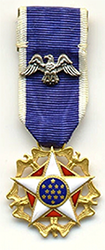
Coach Wooden receives the President Medal of Freedom in ceremonies at the White House. It is the highest civilian honor America gives to a civilian. He publishes a best-selling book for children: INCH and MILES: The Journey To Success (Perfection Learning) based on his philosophy and The Pyramid of Success. He continues to be the focus of media attention and entertains a constant stream of friends and fans at his condo on White Oak Avenue in Encino, CA.
2005-2010
Wooden on Leadership (McGraw-Hill) is published and finds a huge audience among CEO's, managers, small business owners, coaches and others in business and sports. A best-seller, it produces a popular sequel: The Essential Wooden: A Lifetime of Lessons on Leaders and Leadership (McGraw-Hill). UCLA establishes the John Wooden Global Leadership Award as part of the UCLA/Anderson School of Management.
June 5, 2010

John Robert Wooden dies. He is laid to rest next to Nellie Wooden at Forest Lawn Cemetery in Los Angeles.

